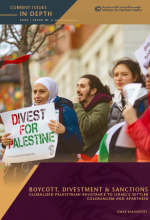The Institute for Palestine Studies has published Omar Barghouti in-depth essay on the BDS movement, including an up-to-date analysis of the state of the movement, its impact and the challenges and opportunities ahead.

Introduction
In an era when the cause of Palestine has suffered multiple setbacks, and when the Palestinian national movement is at a low point of disunity and strategic incoherence, it is heartening that an initiative launched by Palestinian civil society has achieved resounding global success in the face of fierce opposition by the Israeli state and its supporters.
Launched in 2005, the BDS movement organized its efforts around the simple tactics of boycott, divestment and sanctions, and with the straightforward goal of justice for Palestinians under occupation, inside Israel, and in exile from their homeland. The movement built on an approach pioneered by victims of the oldest example of European settler-colonialism. These were 19th century Irish farmers who were the first to use the weapon of boycott against their oppressors, in the person of one Captain Charles Boycott, an agent for Lord Erne, their British landlord. Later adopted by militants fighting for Indian independence, for an end to apartheid in South Africa, and for civil rights in the Jim Crow American South, boycott is one of the oldest and most respected non-violent tools wielded by victims of oppression.
Reliance on the time-tested tactic of boycott has been combined with a push for divestment by public funds, universities and other institutions from corporations that are complicit with the occupation and subjugation of Palestinians, and with a call for international sanctions against Israel for its discriminatory policies. This movement has resonated with a global audience that is increasingly attuned to the realities of Israel’s coercion of the Palestinians under its control, or whom it ethnically cleansed from their ancestral homeland.
The call for BDS has had a particular impact in the United States and Europe, which historically have functioned as the “metropole” for the settler-colonial project – the last of the modern era – that developed into the state of Israel. As the late Tony Judt, once an ardent Zionist, put it, the Zionist movement “arrived too late,” importing “a characteristically late-nineteenth-century separatist project into a world that has moved on.”1 Once controversial, his view has become increasingly less so, in large measure thanks to the BDS movement.
While the Israeli model of ethno-religious discrimination based on ethnic cleansing is not consonant with modern liberal values, in recent years this model has drawn renewed energy from an illiberal, chauvinist nationalist and authoritarian wave the world over, symbolized by authoritarian populist leaders like Bolsinaro, Modi, Orban and Trump. This energy has animated Israel’s campaign against the BDS movement and other advocates of Palestinian rights.
Centrally directed by Israel’s Ministry of Strategic Affairs, massively resourced, and employing legions of lawyers, PR experts, online trolls, and agents skilled in disinformation, this coordinated global campaign has slandered students, academics and other activists for Palestinian rights in increasingly strident fashion. At the same time, this campaign is behind efforts to outlaw BDS in various American states, which have so far produced statutes passed in a number of them. When tested in court, however, none of these laws has withstood judicial scrutiny because they are in flagrant violation of First Amendment freedoms.
The call for BDS and other appeals for Palestinian rights have notched impressive victories on college campuses and in churches and unions all over the US in spite of the determined efforts of opponents of equality and justice for the Palestinians. This has led Israel and its allies to employ their ultimate weapon, the smear of anti-Semitism. In the face of an alarming recent surge in anti-Semitic hate crimes, most of which emanate from the far right, instead of focusing on the main purveyors of real, existing Jew-hatred (some of whom they appallingly count as “friends of Israel”), Israel’s partisans have tried to tar advocates for justice for Palestine with the brush of anti-Semitism. They do this while purposely ignoring the explicit opposition of the BDS movement to all forms of racism, including anti-Semitism, and the broad support among many liberal and progressive Jews, particularly younger ones, for Palestinian rights and for the principles upheld by the BDS movement.
As part of its Current Issues in Depth series, the Institute for Palestine Studies is pleased to offer its readers the following assessment of the BDS movement by one of its founders and leaders, Omar Barghouti, in the hope of spreading understanding of its aims and achievements. As this essay shows, this movement is rooted in universal principles and non-violent tactics employed by movements against oppression ranging from colonial Ireland to Birmingham, Alabama in the 1950s. For its defense against the McCarthyite attacks by partisans of Israel, it relies on the principle of freedom of speech enshrined in both the First Amendment to the U.S. Constitution and Article 10 of the European Convention on Human Rights, a principle that has been upheld by American and European courts. This principle offers a guarantee that the message of equal justice for all – Palestinian Arabs and Israeli Jews – which is the core of the call for BDS will continue to resonate globally.
Omar Barghouti is a Palestinian human rights defender, cofounder of the Boycott, Divestment and Sanctions (BDS) movement for Palestinian rights, and corecipient of the Gandhi Peace Award in 2017.
